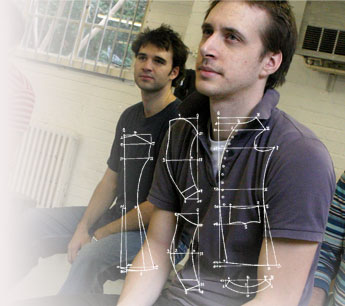


Processes & Techniques
Ci: Creative Intelligence delivers development programmes using
processes and techniques from the world of the arts because they work.
The arts engage individuals on all levels - emotional, physical and
intellectual - and learning is sustained when it can be connected on
all three levels.
1. Rehearsal
Many of the key behaviours in business today are ones which the arts
world has learnt to develop over centuries. Drawing high class performance
out of individuals and teams is exactly what a director does in rehearsal
with actors; coming across to others - clients, staff, colleagues,
customers - in a powerful and impressive way is precisely the skill
of the actor; understanding and influencing other people's emotions
and attitudes - these are the core of the performing arts. And learning
how to refine a performance through rehearsal is a process that all
good development courses should offer. Work - and life - can have a
rehearsal.
2. Communication
Much of our work involves helping people with their communication skills -
giving a presentation, inspiring a team, giving and receiving feedback,
telling someone their performance is not up to scratch, influencing others
to come round to a way of thinking, negotiating a sale, dealing with
customers, articulating a vision and so on. The arts, particularly
the performing arts, are all about such communication which is why
we have so much to offer people in business.
3. Metaphor
Sometimes we use art as a metaphor, to tell a story or to get participants
on a course to work with a story which may not initially seem directly
related to their work situation. But we always make sure that by the end
of the programme, they have realised how the attitudes and behaviours
they have explored on their metaphorical journey can apply just as
powerfully to their day-to-day work.
4. Paradox
Because the arts embrace paradoxes rather than fighting them, they
are an ideal way to grapple with the unpredictability that besets
organisations. The arts are about discipline and flexibility,
creativity and practicality, action and perception, change and stability,
individualism and teamwork, leadership and followership - the list goes on.
Finding the balancing act between these seemingly irreconcilable opposites
is a key challenge facing all organisations today.
5. Learning styles
Although most of our work is experiential, encouraging participants
to "get up and do" rather than sit and talk, we pride ourselves on
catering to all learning styles. Courses are well suited to activist
learners, but we always put our programmes into a framework of well-tested
theory and we allow plenty of opportunity for people to reflect upon
their experiences and digest their learning. Crucially, too, we make
clear connections between the skills learnt on the courses and their
applicability back at the office, particularly when the course has
been following a metaphorical journey.